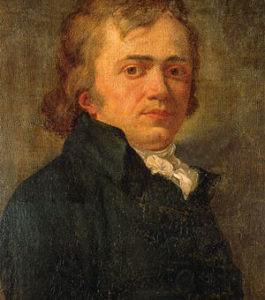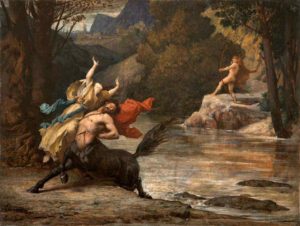William Wordsworth (1770-1850)
Earth has not anything to show more fair:
Dull would he be of soul who could pass by
A sight so touching in its majesty:
This City now doth, like a garment, wear
The beauty of the morning: silent, bare,
Ships, towers, domes, theatres, and temples lie
Open unto the fields, and to the sky;
All bright and glittering in the smokeless air.
Never did sun more beautifully steep
In his first splendour, valley, rock, or hill;
Ne’er saw I, never felt, a calm so deep!
The river glideth at his own sweet will:
Dear God! the very houses seem asleep;
And all that mighty heart is lying still!
World, you just can’t show anything so fair!
What kind of dismal spirit could pass by
a sight so touching? Such nobility!
This City now has clothing on. Such flair!
A matutinal glory, for our Mayor –
cupolas, atria, auditoria, high
sails, holy halls, ‘twixt rustic sward and sky,
shining in post-Bronowski soot-scant air.
Nobody’s caught such sunlight grandly soaking
in its first warmth, low scarp, or rock, or hill;
I don’t know anything so worry-slaking!
Our liquid history rolls on at will.
O loving God! That housing stock’s not waking,
and that prodigious pump is lying still.
More poems by William Wordsworth...
To the Fates
An die Parzen
Friedrich Hölderlin (1770-1843)
An die Parzen
Nur Einen Sommer gönnt, ihr Gewaltigen!
Und einen Herbst zu reifem Gesange mir,
Daß williger mein Herz, vom süßen
Spiele gesättiget, dann mir sterbe.
Die Seele, der im Leben ihr göttlich Recht
Nicht ward, sie ruht auch drunten im Orkus nicht;
Doch ist mir einst das Heil’ge, das am
Herzen mir liegt, das Gedicht, gelungen,
Willkommen dann, o Stille der Schattenwelt!
Zufrieden bin ich, wenn auch mein Saitenspiel
Mich nicht hinab geleitet; Einmal
Lebt ich, wie Götter, und mehr bedarfs nicht.
To the Fates
Grant me a single summer, ye mighty ones,
Grant me an autumn’s ripeness of melody,
That less reluctant, being sated
With the sweet playing, my heart may perish.
Souls, if denied their sacred inheritance
In life, are unquiet too in the underworld;
I, though, achieved ere now the holy
Poetry, close to my heart, the poem.
Then be you welcome, stillness and shadow–world!
I’ll be content, no less, should my minstrelsy
Not guide me down: time was, when I have
Lived like the gods: nothing more is needed.
Translation: Copyright © Timothy Adès
More poems by Friedrich Hölderlin...
Half of Life
Hälfte des Lebens
Friedrich Hölderlin (1770-1843)
Hälfte des Lebens
Mit gelben Birnen hänget
Und voll mit wilden Rosen
Das Land in den See,
Ihr holden Schwäne,
Und trunken von Küssen
Tunkt ihr das Haupt
Ins heilignüchterne Wasser.
Weh mir, wo nehm’ ich, wenn
Es Winter ist, die Blumen, und wo
Den Sonnenschein,
Und Schatten der Erde?
Die Mauern stehn
Sprachlos und kalt, im Winde
Klirren die Fahnen.
DIMIDIUM VITAE
flava pirus, rosa silvarum: defertur onusta
terra superficie lapsa lacustris aquae.
suaviolis olor ebrius it: fas dedere collum:
sobrius in sacrum dat caput ire lacum.
e nive qua capiam flores, vim solis, et umbram?
signa aquilone sonant; moenia muta rigent.
Half of Life
Golden pears, roses wild, slippety–slip,
land leaning lakeward;
swans’–faces, kissy–drunk, dippety–dip,
depth sober–sacred.
O how’ll I find, come winter, flowers,
sunbeams, earth–shadow?
Walls dumb and numb, banners and vanes
shake, clack and rattle.
A HALF OF LIVING
Gold Williams fruit and wild triantaphylls:
Land tilts towards Loch Lomond, almost spills:
You snazzy swans, half–cut with kissing bills,
In pious prosy liquid dunk your skulls!
O how’ll I find blossoms among snowfalls,
Warm rays of sun, shadows that land on soils?
Our flaps and flags clack; dumb and numb our walls.
Translation: Copyright © Timothy Adès
More poems by Friedrich Hölderlin...
The World Is Too Much With Us – Lipogram
Not from Intimations of Immortality
Let’s see whether he needed the letter E…
William Wordsworth (1770-1850)
Not from Intimations of Immortality
Let’s see whether he needed the letter E…
The world is too much with us; late and soon,
Getting and spending, we lay waste our powers; —
Little we see in Nature that is ours;
We have given our hearts away, a sordid boon!
This Sea that bares her bosom to the moon;
The winds that will be howling at all hours,
And are up-gathered now like sleeping flowers;
For this, for everything, we are out of tune;
It moves us not. Great God! I’d rather be
A Pagan suckled in a creed outworn;
So might I, standing on this pleasant lea,
Have glimpses that would make me less forlorn;
Have sight of Proteus rising from the sea;
Or hear old Triton blow his wreathèd horn.
The World Is Too Much With Us – Lipogram
This world is too much with us: fairly soon
working and shopping drain our capital,
and show us almost nothing natural;
our soul is thrown away, a sordid boon.
That flood which flaunts its bosom, moon to moon,
that wind which howls and howls, continual:
all’s a sad bloom, shut down and dropsical
for our disastrous choirs that flatly croon,
lacking all passion. Think of this, good Lord:
brought up a pagan in a faith outworn,
what might I look at, on this dainty sward!
Such sights and sounds, I couldn’t stay forlorn:
a zoomorph, that zooms Apollo–ward,
a Triton, tooting on his wrack–fraught horn.
Translation: Copyright © Timothy Adès
More poems by William Wordsworth...
The Spinner Girl
Die Spinnerin
Johann Heinrich Voss (1751-1826)
Die Spinnerin
Ich armes Mädchen!
Mein Spinnerädchen
Will gar nicht gehn,
Seitdem der Fremde
In weißem Hemde
Uns half beim Weizenmähn!
Denn bald so sinnig,
Bald schlotternd spinn' ich
In wildem Trab,
Bald schnurrt das Rädchen,
Bald läuft das Fädchen
Vom vollen Rocken ab.
Noch denk' ich immer
Der Sense Schimmer,
Den blanken Hut,
Und wie wir beide
An gelber Weide
So sanft im Klee geruht.
The Spinner Girl
Poor girl forlorn
My wheel won’t turn
Since that wayfarer
The white shirt wearer
Helped us cut corn.
I spin, careworn,
Shake uncontrolled.
The wheel whirls wild,
Thread’s all unspooled.
I spin, careworn.
I muse and mourn:
The scythe’s bright sheen,
The hat that shone,
And how we twain
Had sweetly lain
In clover in the yellow corn.
Translation: Copyright © Timothy Adès
More poems by Johann Heinrich Voss...
The King in Thule
Der König in Thule
Johann Wolfgang von Goethe (1749-1832)
Der König in Thule
Es war ein König in Thule,
Gar treu bis an das Grab,
Dem sterbend seine Buhle
einen goldnen Becher gab.
Es ging ihm nichts darüber,
Er leert' ihn jeden Schmaus;
Die Augen gingen ihm über,
So oft er trank daraus.
Und als er kam zu sterben,
Zählt' er seine Städt' im Reich,
Gönnt' alles seinen Erben,
Den Becher nicht zugleich.
Er saß beim Königsmahle,
Die Ritter um ihn her,
Auf hohem Vätersaale,
Dort auf dem Schloß am Meer.
Dort stand der alte Zecher,
Trank letzte Lebensglut,
Und warf den heiligen Becher
Hinunter in die Flut.
Er sah ihn stürzen, trinken
Und sinken tief ins Meer,
die Augen täten ihm sinken,
Trank nie einen Tropfen mehr.
The King in Thule
There was a King in Thule
Was faithful to the grave,
To whom his dying consort
A golden beaker gave.
He valued nothing higher,
At each meal drained the cup;
His eyes were brimming over
Each time he picked it up.
When death was stealing on him,
His kingdom’s towns he told;
Gave all to his successor,
Except the cup of gold.
He sat at royal banquet
With knightly company
In the high hall ancestral,
The castle by the sea.
Up stood the old imbiber
And drained life’s final glow,
And hurled the blessed beaker
Into the waves below.
He saw it falling, filling,
And sinking in the sea;
Down sank his eyes; and never
Another drop drank he.
Translation: Copyright © Timothy Adès
More poems by Johann Wolfgang von Goethe...
In Court
Vor Gericht
Johann Wolfgang von Goethe (1749-1832)
Vor Gericht
Von wem ich es habe, das sag ich euch nicht,
Das Kind in meinem Leib.
Pfui! speit ihr aus: die Hure da!
Bin doch ein ehrlich Weib.
Mit wem ich mich traute, das sag ich euch nicht.
Mein Schatz ist lieb und gut,
Trägt er eine goldene Kett am Hals,
Trägt er einen strohernen Hut.
Soll Spott und Hohn getragen sein,
Trag ich allein den Hohn.
Ich kenn ihn wohl, er kennt mich wohl,
Und Gott weiß auch davon.
Herr Pfarrer und Herr Amtmann ihr,
ich bitt, lasst mich in Ruh!
Es ist mein Kind, es bleibt mein Kind,
Ihr gebt mir ja nichts dazu.
In Court
The child inside me, whose it is
I won’t be telling you.
You spit on me and call me whore,
I’m an honest woman and true.
I won’t be telling you who he is,
My truelove, kind and good,
Be there a gold chain on his neck
Or a straw hat on his head.
If there is mockery and scorn,
I’ll bear the scorn alone.
I know him well, he knows me well:
To God it’s all well-known.
So, reverend Sir, your Honour too,
Leave me in peace, I pray:
You serve me not. This child is mine,
Is mine, and mine shall stay.
Translation: Copyright © Timothy Adès
More poems by Johann Wolfgang von Goethe...
The Stars
Die Gestirne
Johann Wolfgang von Goethe (1749-1832)
Die Gestirne
Gott hat euch die Gestirne gesezt
Als Leiter zu Land und See
Damit ihr euch daran ergezt
Stets blickend in die Höh.
The Stars
God has set the stars, your bright
Guides by land and sea:
Turn your gaze then with delight
Upward, constantly.
Translation: Copyright © Timothy Adès
More poems by Johann Wolfgang von Goethe...

 Translation: Copyright © Timothy Adès
Published in Classical Association News, and online in Poetry Atlas.
Milton describes the frenzy of Hercules:
As when Alcides (i.e., Hercules) from Oechalia crowned
With conquest, felt the envenomed robe, and tore,
Through pain, up by the roots Thessalian pines
And Lichas from the top of Oeta threw
Into the Euboic Sea.
Oeta is a mountain in Thessaly.
Hercules and Deianeira were to marry. The centaur, Nessus, assaulted her and Hercules shot him. The dying Nessus persuaded her to spread his blood on Hercules’ shirt, as a love-potion: but it was a searing poison. Years later, jealous of two other women, she used it. Hercules, as a son of Zeus, can be seen in the night sky.
Translation: Copyright © Timothy Adès
Published in Classical Association News, and online in Poetry Atlas.
Milton describes the frenzy of Hercules:
As when Alcides (i.e., Hercules) from Oechalia crowned
With conquest, felt the envenomed robe, and tore,
Through pain, up by the roots Thessalian pines
And Lichas from the top of Oeta threw
Into the Euboic Sea.
Oeta is a mountain in Thessaly.
Hercules and Deianeira were to marry. The centaur, Nessus, assaulted her and Hercules shot him. The dying Nessus persuaded her to spread his blood on Hercules’ shirt, as a love-potion: but it was a searing poison. Years later, jealous of two other women, she used it. Hercules, as a son of Zeus, can be seen in the night sky.